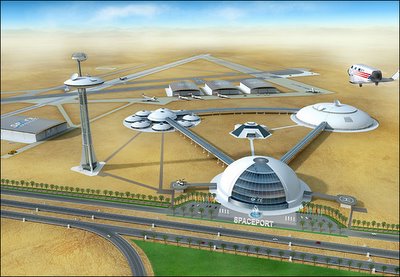 An artist's rendering of a proposed commercial spaceport in the United Arab Emirates. From The New York Times
An artist's rendering of a proposed commercial spaceport in the United Arab Emirates. From The New York TimesI found this off The New York Times:
The space tourism industry, its millionaire would-be passengers impatiently tapping on their platinum credit cards, just got a little more crowded, with the announcements of a new rocket development company and of plans to build a $265 million spaceport in the United Arab Emirates.
Three telecommunications entrepreneurs from Texas have joined with Space Adventures Ltd., the company that sent the first paying passengers to the International Space Station, to develop passenger spacecraft for suborbital flights.
The vehicles would be designed by a Russian company, and the first ships could be ready before 2008, said one of the entrepreneurs, Hamid Ansari, who with his wife, Ansousheh, and brother, Amir, helped finance the Ansari X Prize competition — the one that resulted in the first private flight to the edge of space, in 2004.
And Space Adventures announced today that it would build the spaceport in the emirate of Ras al Khaimah with an initial $30 million investment from its government. Eric Anderson, president and chief executive of Space Adventures, said Singapore would soon announce spaceport plans of its own.
These and other recent developments increase the likelihood that within a few years, nonastronauts who can afford a six-figure ticket will have the chance at a few minutes of weightlessness and black sky.
Guess what folks--this is the future of space! Forget the International Space Station, or the manned mission to Mars. What we need is to have private companies take the initiative to embark on their own commercialization projects in space. We need to make travel into space cheaper and more cost effective, than what we currently have through the NASA Space Shuttle program. And this newly envisioned space tourism industry is a fantastic primer for humanity to break into this new world. These tourism companies are at the forefront of developing cheaper, more radically designed rockets and space planes to lift their passengers into orbit. Their success will entice other companies to explore other aspects of industrializing and commercializing space--consider biological and medical research in zero-gravity, or exploring new properties of metals or plastics in a weightless environment. There is the colonization of the moon, and the endless possibilities of creating new products and services there. As companies can gain more experience with living and working conditions in space, that experience can be directed towards even more ambitious projects such as a manned mission to Mars.
That does not say that government doesn't have a role in space travel and tourism. Government still has an important role as both a monitor and regulator of these new industries. Government institutions, such as NASA, can monitor how these space tourism industries can operate, and perhaps adapt their technologies and proceedures into their own organizations. The government can also work with industry to develop new regulations regarding space travel safety, and emergency procedures--similar to procedures found in air travel. And both government and industry can work together in creating ambitious new space station, and moon colonization plans.
This is just the first step.
No comments:
Post a Comment